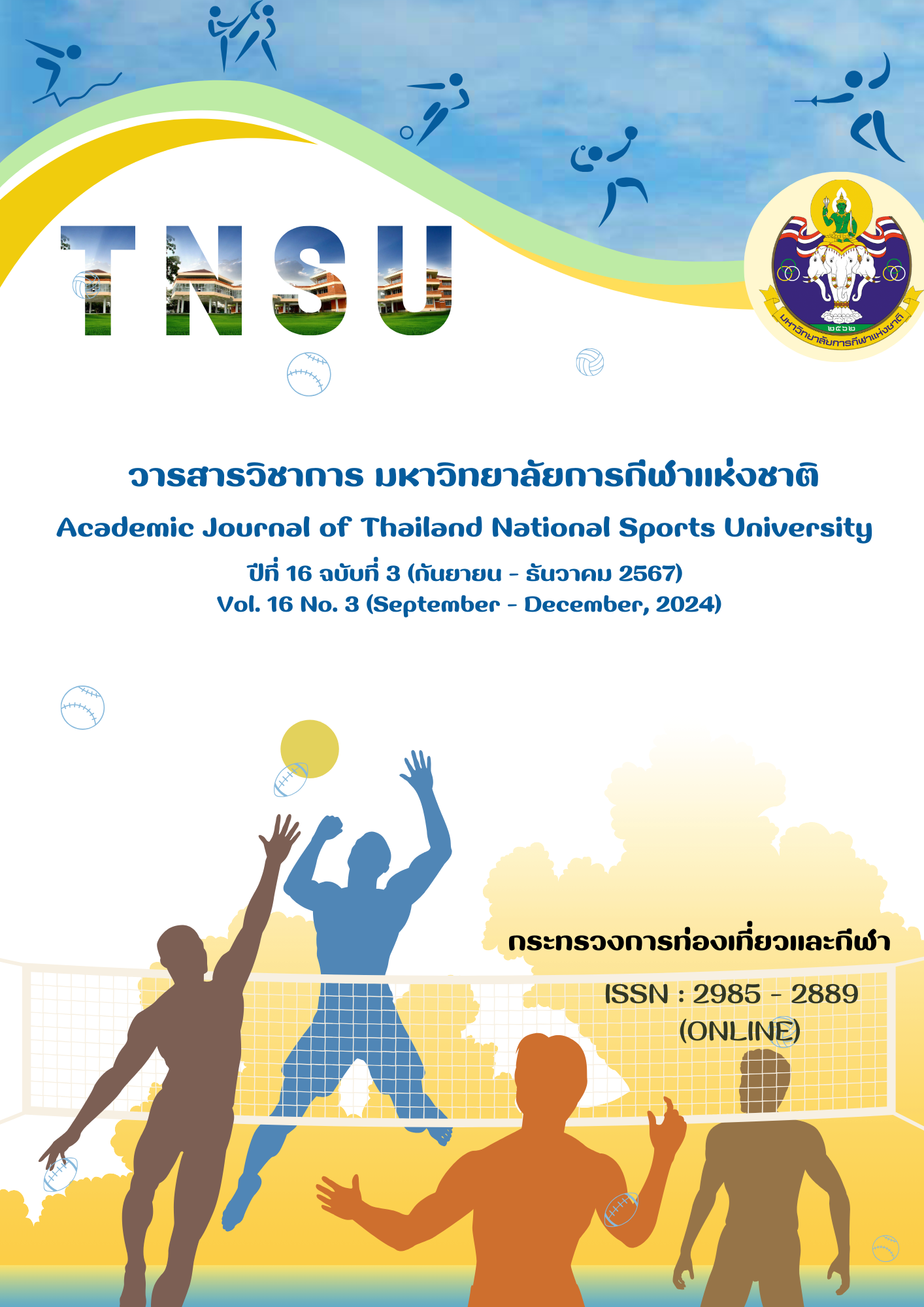EFFECTS OF HEALTH EDUCATION LEARNING MANAGEMENT USING WORK – BASED ON LEARNING ACHIEVEMENT AND INNOVATION SKILLS OF SECONDARY SCHOOL STUDENTS
Main Article Content
Abstract
The purposes were to: 1) compare mean scores of learning achievement health education and innovation skills before and after implementation of an experimental group and a control group 2) compare mean scores of learning achievement health education and INNOVATION skills between the experimental group and the control group. The samples consisted of 60 students secondary in the first semester of the 2023 academic year and selected by cluster random sampling 30 of the experimental group was assigned to study under the health education learning management using work – based on secondary students and 30 of the control group was assigned to study with conventional teaching method. The research instruments were comprised of 8 health education lesson plans using work – based on learning with IOC of 0.99 and the data collection instruments included learning achievements in the area of knowledge, attitude, practice tests and innovation skills test with IOC of 0.89, 0.99, 0.94 and 0.97, reliabilities of 0.81, 0.91, 0.86 and 0.96. The duration of the experiment was 8 weeks. Data were analyzed by mean, standard deviation and t-test at .05 level (Paired-Sample t-test, Independent-Sample t-test).
Results: The research findings were as follows: 1) The mean scores of the learning achievement knowledge, attitude, practice and innovation skills of the experimental group students after learning were significantly higher than before learning at .05 level. 2) The mean scores of the learning achievement knowledge, attitude, practice and innovation skills of the experimental group students after learning were significantly higher than the control group students at .05 level. Conclusion: health education learning management using work – based effect on learning achievement and INNOVATION skills of tenth grade students higher than health education learning management with conventional teaching method.
Article Details

This work is licensed under a Creative Commons Attribution-NonCommercial-NoDerivatives 4.0 International License.
The published article is a copyright of the Academic Journal of Thailand National Sports University. The passage appeared in each article in this academic journal is a perspective of each author which is not related to the journal. Each author is required to be responsible for all components of his/her own article. If there are any mistakes, each author must be responsible for those mistakes on his/her own.
References
Aimutcha Wattanaburanon. (2020). LOVE model and health education learning management. Journal of Liberal Arts, Maejo University, 8(1), 223 - 245.
Akesit Chanintarapum. (2020). The development of an instructional model base on steam to enhance technological innovation creativity skills. Research and Development Journal Suan Sunandha Rajabhat University, 13(1), 246 – 265.
Alongkot Yawai, & Natthawat Vongchavalitkul. (2019). Development of learning outcomes by creating a learning environment based on working in real conditions. Journal of Education Studies Chulalongkorn University, 48(2), 407 - 427.
Bussakorn Chalermsinsuwan, & Jintana Sarayuthpitak. (2019). Effects of health education learning management using work - based learning on self - care and communication skills of third grade students. Journal of Education Studies Chulalongkorn University, 47(1), 163 - 180.
Gray, D. (2010). Work - based Learning, action learning and the virtual paradigm. Retrieved from http://www.leeds.ac.uk/educol/documents/00001260.html
Guilford, J. P. (1967). The nature of human intelligence. New York: McGraw Hill.
Thai Health Promotion Foundation. (2022). Thai health 2022: The Thai family & COVID-19. Nakhon Pathom: Amarin Printing and Publishing Public Company Limited.
Jintana Sarayuthpitak. (2022). Health education learning management in the 21st century. Bangkok: Chulalongkorn University Publishing House.
Kulatida Meesomboon. (2018). Work – based learning to promote early childhood education students in learning experiences for young children. Mangraisaan Journal, 6(2), 53 - 64.
Marut Patphol, & Wichai Wongyai. (2021). Development of leaning management model for creative and innovation skills enhancement of primary students: A case study in Thailand. Elementary Education Online, 20(1), 217 - 227.
Ministry of Education Thailand. (2008). Basic education core curriculum B.E. 2551, A.D. 2008. Retrieved from https://www.ipst.ac.th/wp-content/uploads/2020/10/CoreCurriculum 2551-en.pdf
Mutita Eamtip, & Ubonwan Songserm. (2022). The development of problem - based learning model to for fostering creative innovation ability of secondary 1 student. Journal of Institute of Trainer Monk Development, 5(3), 64 - 75.
Phumphakhawat Phumphongkhochasorn, Pongkrit Nampapon angkul, Tassanee Chotientip, & Wirat Maneephruek. (2021). National educational standards and the improvement of Thai education system with world class. Asia Pacific Journal of Religions and Cultures, 5(1), 87-100
Raelin, J. (2011). A model of work-based learning. Retrieved from http://www.jstor.org/pss/ 2635156
Paitoon Sinlarat. (2015). Creative and productive educational philosophy. Chulalongkorn University.
Siriluk Thaipong, Sarinya Rodpipat, & Jintana Sarayuthpitak. (2023). Development of health education learning using problem-based approach and socratic questioning to enhance learning achievement and creative problem solving of secondary school students. Academic Journal of Thailand National Sports University, 15(1), 259 - 274.
Somsak Bunprom. (2021). Design of learning management in physics through problem - based learning to promote creative skill and innovation. Journal of Education Khon Kaen University, 44(2), 175 - 188
Sopa Choychod. (2020). Effects of health education learning management using problem - based learning and social information processing theory on learning achievement and problem - solving abilities with respect to cyberbullying behavior of eighth grade students. Journal of Education Studies Chulalongkorn University, 48(2), 301 - 320.
Sujaree Samang, & Namthip Ongardwanich. (2022). The development of measurement scale on creative innovation skills for secondary school students. Suan Dusit Graduate School Academic Journal, 18(2), 67 - 83.
Tissana Khaemmanee. (2009). Teaching science: Knowledge for organizing an effective learning process. Bangkok: Chulalongkorn University Publishing House.
Wachiravit Changkeaw, & Jintana Sarayuthpitak. (2019). Effects of health education learning management using productivity-based instructional model on learning achievement and ability to create health innovation media of tenth grade students. Journal of Education Studies Chulalongkorn University, 47(4), 429 - 444.
Wannee Kaemkate. (2012). Behavioral science research methods. Bangkok: Chulalongkorn University Publishing House.


